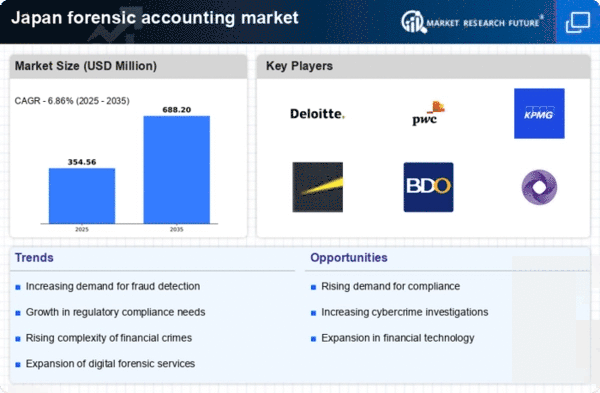Escalating Cybersecurity Threats
The rise in cybersecurity threats in Japan has led to an increased reliance on forensic accounting services. As businesses face sophisticated cyberattacks, the need for forensic accountants to investigate financial discrepancies and data breaches becomes critical. The forensic accounting market industry is witnessing a surge in demand for professionals skilled in digital forensics and cyber risk assessment. In 2025, it is estimated that the market will grow by approximately 10%, driven by the necessity for organizations to protect their financial data and maintain consumer trust. This trend underscores the importance of integrating forensic accounting practices with cybersecurity measures, as companies aim to safeguard their assets and ensure compliance with evolving regulations.
Expansion of Financial Services Sector
The expansion of the financial services sector in Japan is a key driver of growth in the forensic accounting market. As financial institutions diversify their offerings and engage in more complex transactions, the need for forensic accounting services becomes increasingly apparent. The forensic accounting market industry is projected to grow by 8% in 2025, fueled by the demand for services such as fraud investigation, risk assessment, and compliance audits. This growth is particularly relevant in light of the evolving financial landscape, where institutions must adapt to new regulations and market dynamics. Consequently, forensic accountants are positioned as essential partners in ensuring the integrity and transparency of financial operations.
Growing Corporate Governance Standards
The increasing emphasis on corporate governance in Japan has a profound impact on the forensic accounting market. As companies strive to enhance transparency and accountability, the demand for forensic accounting services rises. This trend is particularly evident in sectors such as finance and manufacturing, where compliance with stringent regulations is paramount. In 2025, the market for forensic accounting services in Japan is projected to reach approximately $1.5 billion, reflecting a growth rate of around 8% annually. This growth is driven by the need for organizations to mitigate risks associated with financial misconduct and to ensure adherence to corporate governance standards. Consequently, the forensic accounting market industry is likely to experience heightened demand as businesses seek to bolster their internal controls and audit processes.
Heightened Awareness of Financial Fraud
In Japan, there is a growing awareness of financial fraud, which significantly influences the forensic accounting market. As incidents of fraud become more publicized, organizations are increasingly investing in forensic accounting services to detect and prevent fraudulent activities. The forensic accounting market industry is expected to expand as companies recognize the financial and reputational risks associated with fraud. In 2025, the market is projected to grow by 9%, reflecting the urgent need for businesses to implement robust fraud detection mechanisms. This heightened awareness prompts organizations to engage forensic accountants to conduct thorough investigations and provide expert testimony in legal proceedings, thereby reinforcing the demand for specialized services.
Regulatory Compliance and Legal Requirements
The stringent regulatory environment in Japan necessitates that businesses adhere to various legal requirements, thereby driving the demand for forensic accounting services. Companies are increasingly required to conduct audits and investigations to ensure compliance with laws and regulations. The forensic accounting market industry is likely to benefit from this trend, as organizations seek to avoid penalties and legal repercussions. In 2025, the market is anticipated to grow by approximately 7%, as businesses prioritize compliance and risk management. This growth is indicative of the critical role that forensic accountants play in helping organizations navigate complex regulatory landscapes and maintain operational integrity.
















